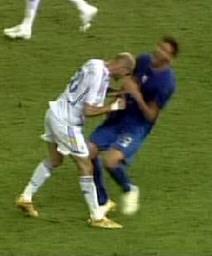Zinedine Zidane was sorry he headbutted Italy defender Marco Materazzi in the 2006 World Cup Final, according to a tell-all book on the France legend coming out next week.
Zidane has never publicly apologised for the incident which ended his career but the book claims he confided his feelings to a relative.
In 'Zidane's Hidden Face', author and journalist Besma Lahouri recounts that an Algerian relative of the French-Algerian legend drove to see him in December 2006 and praised him for reacting to niggling from Materazzi ''in a gesture typical of our home''.
Zidane is quoted as replying: ''Never say I was right...I wasn't right and I'm sorry''.
The headbutt has gone down in soccer history but so far only Materazzi has gotten mileage out of it.
Earlier this year he won a libel case against British tabloid The Daily Star for claiming he uttered racist slurs against Zidane's mother.
The World Cup-winning defender has another two cases pending against The Sun and The Daily Mail for alleging it was the Inter player's anti-Muslim comments against Zidane's mother that sparked the notorious incident.
Last year the Inter stopper finally admitted what he said to make Zidane see red after a prolonged bout of shirt-pulling.
When Zidane told him he could have the shirt at the end of the match if he wanted it so much, Materazzi suggested he'd rather have Zidane's sister.
''Tua sorella'' (Your sister) is a very common expression used in jest on the streets and on fields of play to tease or provoke.
The truth about the pre-butt verbals was a secret for months.
Before Materazzi's admission, Zidane would only say his marker said ''something insulting'' about his sister.
Zidane, who was initially slammed for disgracing himself during his swansong and ruling himself out of the deciding penalty shoot-out, was later praised in France for defending his family honour.
Materazzi became the villain of the piece.
But by Christmas 2006 the French press said it had changed its mind and decided to bury the hatchet.
The France Football magazine, organiser of the European Footballer of the Year competition, gave its readers five reasons to ''bury the hatchet'' with Materazzi for the insult that caused Zizou to lose his head and end his career under a cloud.
These were: ''1) (Materazzi) played a great World Cup; 2) he is very skillful; 3) he speaks his mind; 4) he is an open-hearted man; and 5) he loves France''.
The July 9 2006 headbutt, which resulted in Zidane missing the end of extra time, spurred a stream of debate in which the ex-Juventus and Real Madrid player moved from zero to hero, and back again.
BUTT SPIN-OFFS.
The headbutt soon appeared in an Internet game in which players made Zidane hit Materazzi as often as they felt like, and was later turned into a hit song that echoed around Italian beaches.
A Chinese businessman bought the rights to head-butt cut-outs to be put on clothes and accessories.
A young Italian designer launched a line of tops featuring a stylised logo of a man hitting someone with his head.
Alessandro Ferrari dubbed his range Xqua, pronounced Perqua, to echo the ''Pourquoi, pourquoi, pourquoi?'' (Why, why, why?) with which French public TV's shocked commentator reacted to Zizou's apparently inexplicable act.
Materazzi, who was banned for two games - one less than his illustrious opponent - for making the French legend hit him, issued a charity book, What I Really Said To Zidane, which became a bestseller in Italy.
The scores of alleged 'provocations' included ''Where exactly is the sternum, Zizou?'' and ''What's wrong Zinedine, you haven't lost yet and you've already torn your hair out''.
Other pearls included threats to tell the France midfield genius the ending of US cult series Lost or get him into the next edition of the desert-island reality show I'm A Celebrity, Get Me Out Of Here.
Materazzi also delighted in playing against his French media image of vulgar ignoramus, taunting Zidane with the ultimate insult for a nation that prides itself on its intellectual prowess: ''French philosophy hasn't been the same since Foucault died''.









